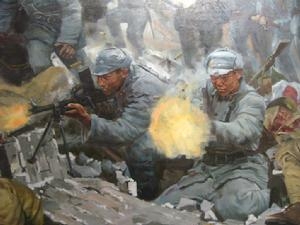(单词翻译:单击)

In Chinese video games (authorised by the state), players slaughter Japanese soldiers from the Sino-Japanese war of 1937-1945. On the sets of Chinese TV dramas, extras playing Japanese soldiers get slaughtered every day. And in geopolitics, China is disputing Japan's sovereignty over some uninhabited rocks in the East China Sea - and soon, perhaps, over Okinawa Island too.
在中国多款电子游戏(经由政府授权)中,玩家可以在1937年至1945年的“抗日战争”中杀戮日本兵。在中国多部电视剧中,扮演日本兵的临时演员每天都在被屠杀。而在地缘政治中,中国正与日本在中国东海几个无人居住岩石的主权问题上争吵不休——也许不久两国还会就冲绳岛产生同样的争端。
The Chinese have rediscovered “their” second world war. Just as the conflict fades from memory in the west, it has become salient as never before in China. To understand the country today, we need to understand its long-forgotten war, argues Rana Mitter, professor of Chinese history and politics at Oxford. Remarkably, his new book is the first full account of the Sino-Japanese war ever published in English.
中国人已经重新发现了“自己的”二战。就在二战在西方人的记忆中逐渐淡去的同时,二战在中国正变得前所未有地清晰。牛津大学中国历史与政治学教授拉纳•米特(Rana Mitter)声称,为理解今日中国,我们需要先理解其经历的这场长期被遗忘的战争。值得一提的是,他的新书是第一本已出版的面解读抗日战争的英文图书。
Perhaps 15 million Chinese died in the conflict, nearly 20 times the number of American and British war dead combined. Yet for decades China's ruling Communists rarely mentioned the war. After all, it hadn't particularly been their war. The Nationalist leader Chiang Kai-shek was China's main commander. The Communist party acted as his “junior partner”, writes Mitter. Indeed, in Mitter's account Mao Zedong is a relatively minor character, sitting out the war in the backwater of Yan'an. Occasionally Communist soldiers fought the Japanese, but during the war they also intermittently fought the Nationalists.
在二战中丧生的中国人可能达到1500万,接近英美两国二战死亡总数的20倍。然而几十年来,作为执政党的中国共产党员很少提及这次战争。毕竟,这不是专属于他们的战争。国民党领导人蒋介石当时是中国的主要指挥官。米特写道,中共当时是蒋介石的“小伙伴”。实际上,按照米特的说法,毛泽东是个相对次要的人物,当时他躲在延安的穷乡僻壤里,静观战局变化。中共的部队偶尔会与日军作战,不过在抗战期间,他们还不时与国民党军打起来。
After Mao won the Chinese civil war in 1949, driving Chiang to Taiwan, he wasn't keen to talk up the feats of his defeated Nationalist enemy. That's why the long Japanese bombing of Nationalist-run Chongqing - China's equivalent of the London Blitz - was quietly remembered in Mao's day only by people who had lived through it.
1949年,毛泽东打赢了中国内战并把蒋介石赶到了台湾,此后他并不愿过多谈及手下败将国民党军在抗战中的壮举。正是出于这个原因,在毛泽东统治时代,日本人对国民党治下的重庆进行的长期轰炸(相当于中国版的伦敦闪击战(the London Blitz))仅仅被那些曾经历过的人们默默地记在心里。
Westerners all but forgot China's war. Under Mao, China became a closed communist country, whereas Japan was a western ally. Chinese archives were closed. Few western scholars could read Chinese anyway. And so China became, in Mitter's phrase, “the forgotten Allied power”. Westerners similarly undervalued the Soviet war effort until Russian archives opened in the 1990s.
西方人也差点忘掉中国的战争。在毛泽东的领导下,中国变成一个封闭的共产主义国家,而日本则成为西方的盟友。中国的档案是不公开的。而且就算公开,也没几个西方学者能读懂中文。因此,按照米特的说法,中国成为“被遗忘的同盟国”。与此类似,西方人也低估了苏联人对二战胜利的贡献,这种状况直到上世纪90年代俄罗斯公开档案才发生改观。
Only in the 1980s did China start to commemorate the Sino-Japanese war as more than just a heroic Mao-led prelude to communist nirvana. In 1985 a museum opened in memory of the Japanese “Rape of Nanjing” of 1937-38 - a slaughter of up to 300,000 people that had never previously much interested the party because it hadn't been there. Today Nanjing is much-discussed in China; rather more so than bigger massacres of Chinese by Chinese, notably Mao's Great Leap Forward and the Cultural Revolution.
到了上世纪80年代,中国在纪念抗日战争时,才开始不再仅仅把它视为毛泽东领导中国进入共产主义“天堂”的一首英雄主义序曲。1985年,一座为铭记在1937到1938年日军“南京大屠杀”事件中共30万遇害同胞的纪念馆落成开放了。由于南京并非中共领地,这场屠杀在此之前从没引起过中共多大兴趣。如今,南京大屠杀在中国被广泛讨论,其热烈程度远远超过中国人之间更大规模的自相屠杀,特别是毛泽东发起的“大跃进”(Great Leap Forward)和“文化大革命”(Cultural Revolution)。
The post-Mao party revived the Sino-Japanese war, mostly because it needed a new ideology to replace communism. That need became urgent after the Tiananmen Square uprising of 1989. In a dictatorship, Mitter told me, “There are two things you can do. One is to run the economy really well, and the other is to make people feel nationalistically proud. Nationalism is a very powerful button to press.” Similarly in Yugoslavia, Slobodan Milosevic dropped communism for nationalism.
毛泽东时代过后,中共大张旗鼓地重提抗日战争的话题,在很大程度上是因为需要新的意识形态来取代共产主义。在1989年天安门事件之后,这一需求变得非常迫切。米特在书中告诉我,独裁统治下“可以做到两件事。其一是把经济治理得极其出色,另一件事就是让人们体会到民族自豪感。民族主义是一种极有影响力的手段。”南斯拉夫与中国的情况相类似,斯洛博丹•米洛舍维奇(Slobodan Milosevic)也用民族主义取代了共产主义。
War talk had other uses for the new China. By talking up the shared battle of all Chinese, Communist and Nationalist, the party hoped to woo the Taiwanese. This hasn't always worked. As Mitter says: “Chinese praise for Chiang has coincided with a severe downgrading of shares in Chiang Kai-shek in Taiwan, where he's now regarded as a dictator who oppressed the people of Taiwan for many years.” War talk also sends a reminder to former western allies: that China, the new “responsible great power”, was with them when it mattered.
在新时代的中国,战争话题还有其他用处。中共大量谈论所有中国人(包括中共和国民党)共同参加过的战争,希望通过这种方式向台湾人示好。这种方式并不总是能够奏效。正如米特所说:“中国人开始赞美蒋介石的时候,蒋介石在台湾的影响力已严重下滑,如今他在台湾被视为压迫台湾人民多年的独裁者。”战争话题还能向前西方盟国传递一种信息:中国这个新的“负责任大国”在关键时刻和他们是持有同样立场的。
But in western countries, the second world war is fading into history. The Iraq war was probably the last time ever that an American president (with a bust of Winston Churchill in his office) would invoke shared Allied memories to cajole European countries into joint war. The European Union, built to unite a continent destroyed by war, has lost its sense of mission partly because the war is being forgotten.
然而在西方国家,二战正湮没在历史之中。美国前总统小布什发起的伊拉克战争,对于美国总统得以唤起欧洲国家心中的盟军战史来调动它们投入共同战斗来说,可能是最后一次了。小布什办公室里挂着一张温斯顿•丘吉尔(Winston Churchill)的半身像。欧盟(EU)成立的初衷是为了令一个遭到战争破坏的大洲团结起来,如今它已失去了使命感,部分原因是那场战争正在被人遗忘。
In China, by contrast, the Sino-Japanese war now looms so large that it sometimes eludes the Communist party's control. Many Chinese citizens show an anti-Japanese fervour that embarrasses the leadership. For instance, Chinese officials generally find Japan's nostalgic rightwing prime minister Shinzo Abe (grandson of a suspected war criminal) a man they can do business with. But many ordinary Chinese get angry when, say, Abe makes tactless comments about the foreign “comfort women” used as sex slaves by Japan's wartime army.
与此形成鲜明对照的是,抗日战争的话题如今在中国影响如此之大,以至于有时候甚至超出了中共的控制。许多中国公民都表现出反日倾向,这令领导层十分尴尬。比如,中国官员通常认为,对于日本那位怀旧的右翼首相安倍晋三(Shinzo Abe)(一位疑似战犯的外孙)来说,是可以跟他做些交易的。但是,当安倍晋三发表那些关于外国“慰安妇”(这个词用来指战时日本军队的性奴)的不得体的言论时,许多普通中国人被激怒了。
Microbloggers on Weibo, the “Chinese Twitter”, often refer to the Japanese as “dwarf bandits” - a wartime (and Ming-era) insult. Sometimes popular anger goes beyond words. Last September, violent anti-Japanese demonstrations were broken up by Chinese police with water cannons. Popular anger may also be pushing China's new President Xi Jinping to hang tough in his dangerous dispute with Japan over the tiny islands in the East China Sea. Now some Chinese scholars and military officers are even claiming Okinawa for China. The Communist party is riding belligerent nationalism, but it is struggling to stay on the horse.
在“中国版推特(Twitter)”新浪微博(Weibo)上,博主们经常将日本人称为“倭寇”,这是明代中日交战时对日本人的一种蔑称。有时候,民众的愤怒不仅仅表现在言语攻击上。去年9月,民众发起了暴力反日示威活动,随后被持水枪的警察驱散了。民众的愤怒,可能也还迫使中国新任国家主席习近平在与日本在围绕中国东海几个小岛的危险争端中保持强硬立场。如今部分中国学者及军官甚至宣称冲绳的主权也属于中国。中共正驾驭着一匹民族主义的烈马,而它要保证不从马背上摔下来却十分困难。


